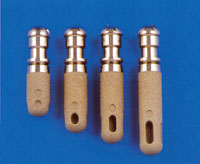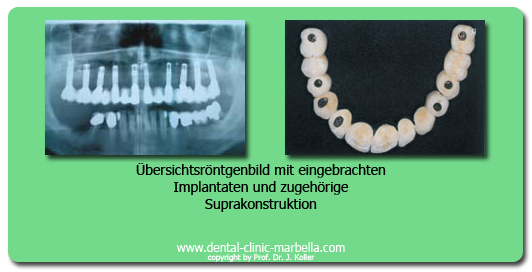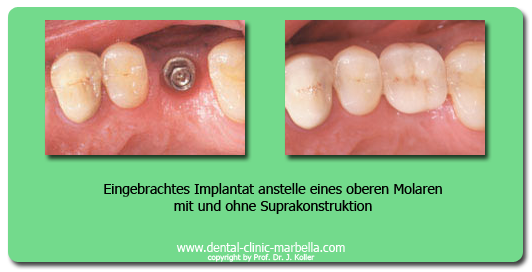Implants
What is an implant?

Titanium implants of various sizes
In traditional dentistry the replacement of dental parts was the fitting of crowns or artificial teeth in the form of bridges, partial or total prosthesis.
The dental root is not replaced.
The result was painful symptoms such as wear on neighboring teeth or the loss of bone mass due to the lack of chewing pressure.
Restoration
An implant is an artificial root made from biologically compatible material.
This material, in general titanium, is harmless to humans, it does not damage the tissue and does not cause allergies.
This artificial root holds permanently onto the jawbone and has a “pillar”.

before: without Implant
The visible, porcelain part is then fixed to this “pillar”.
Bacterial plaque can cause complaints related to the dental fixing apparatus.

after: with Implant
Implants can compensate for the total or partial loss teeth. They avoid the loss of bone mass from the jaw.
They are “natural” prosthesis:
Not only is the dental piece restored but also the root.
In this way both the function and the aesthetic of the dental apparatus is restored.
Who may benefit from an implant?
Whether a patient needs one, several or all of the teeth reconstructing, implants, except in a few cases, offer a natural solution for the attachment of prosthetics or reconstructed pieces.
The jawbone must have a minimum mass for the implant to adhere properly.
How does the implant work?
First, one opens the gum under local anesthetic, to then use a drill in the jawbone of exactly the same size as the implant. Then the artificial root is implanted in the jawbone.
The gum is then closed which allows the implant to settle with time.
After two or three months, the implant is fixed to the bone.
At this moment the artificial tooth can be placed over the implant.
After the treatment, the implant has the same strength as a natural tooth.
Oral hygiene is of decisive importance!
For the lasting success of the implant oral hygiene is of decisive importance.
Above all plaque and tobacco can put the implant in danger. Poor oral hygiene and smoking can increase the risk of losing the implant drastically!

|
Some examples of implant work
|

|






